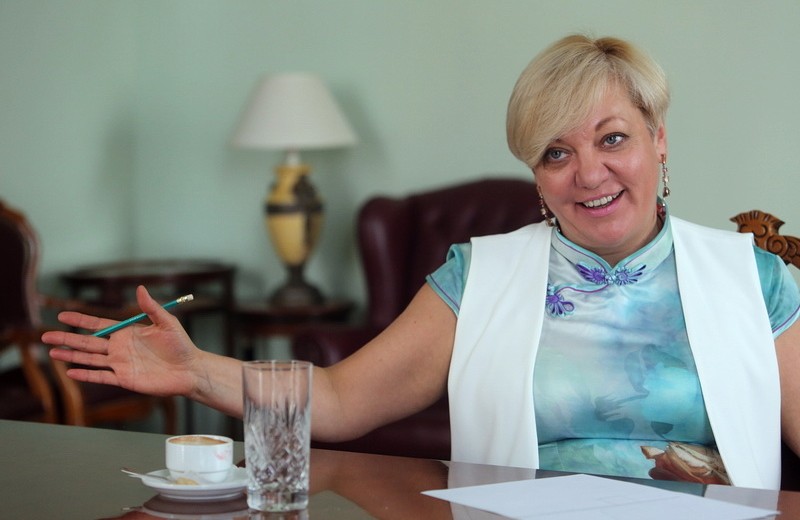Head of the National Bank of Ukraine Valeria Gontareva ranked first in the list of top 100 most influential women compiled annually by Ukrainian magazine Focus.
Gontareva, 52, went up from the second position in the last year’s ranking and took over the first place from last year’s leader, ex-Finance Minister Natalia Jaresko, who didn’t make it to the list this year.
The ranking tends to change significantly year after year since the EuroMaidan Revolution in 2013, according to the introduction published by Focus. As many as 23 participants, almost a quarter of the women from the 2015 ranking, didn’t make it to the top 100 this year.
The leader of the 2016 ranking, Gontareva, was ranked only 98 in 2012, and didn’t make the list at all in 2013.
Top 10
| 1 | Valeria Gontareva | NBU governor |
| 2 | Iryna Gerashchenko | Verkhovna Rada |
| 3 | Yulia Tymoshenko | Head of Batkivshchyna party |
| 4 | Khatia Dekanoidze | Head of National Police |
| 5 | Liliya Hrynevych | Education Minister |
| 6 | Oksana Syroid | Deputy head of Verkhovna Rada |
| 7 | Yuliya Kovaliv | Deputy Minister of Trade |
| 8 | Ivanna Klympush-Tsintsadze | Deputy Prime Minister |
| 9 | Ulana Suprun | Acting Health Minister |
| 10 | Olena Pinchuk | Head of ANTIAIDS foundation |
Six out of 10 leaders who topped the 2016 ranking appeared in the top 10 for the first time in their career.
Apart from Gontareva, the only two women who kept their positions in the top 10 since 2015 were Yulia Tymoshenko, the leader of Batkivshchyna party, who used to top the list once, but came third for the second year in a row, and Deputy Head of Verkhovna Rada Oksana Syroid, who was ranked sixth – the same as in 2015.
Iryna Gerashchenko, first deputy head of the Verkhovna Rada and President Petro Poroshenko’s envoy for the regulation of conflict in the eastern Ukraine, went up from the 11th to the second position. Since the last ranking, Gerashchenko became deputy head of parliament and had a role in the release of several high-profile Ukrainian prisoners from Russia and the occupied parts of the Donbas. Gerashchenko also represents Ukraine in numerous international organizations.
The fourth position belongs to Khatia Dekanoidze, chief of Ukrainian National Police, who appeared on the list for the first time. Dekanoidze is in charge of the reform of the police, which is often named by the government as an example of real reforms after the Euromaidan Revolution.
Ukraine’s Minister of Education and Science Liliya Hrynevych was ranked fifth, gaining 17 points since the 2015 ranking. Focus wrote that she had her first big achievement after only six months in the office when she successfully lobbied adoption of an education bill in the first reading.
Yuliya Kovaliv, the First Deputy Minister of Trade, was ranked seventh. Kovaliv, who is in charge of reforming state enterprises and investment policy, is also a member of the supervisory board for Ukrainian state-owned oil and gas trader Naftogaz.
Deputy Prime Minister on European Integration Ivanna Klympush-Tsintsadze went 38 positions up and was ranked eighth on the list
The Acting Health Minister of Ukraine Ulana Suprun made her debut on the list, appearing at the ninth position.
Olena Pinchuk lost six positions and ended up at the 10th place. Pinchuk is the founder of ANTIAIDS Foundation and co-owner of StarLightMedia, a holding that owns three big TV networks. She is the wife of billionaire Victor Pinchuk and daughter of ex-President Leonid Kuchma.
Who they are
The magazine says that an average age of women in the ranking has been coming down for the past two years. In this year’s ranking, the average age is 45 years. At the same time, the education indicator has been growing – every year, the participants of the ranking are more and more educated.
In general, most of the women influence the public life due to their jobs, according to Focus.
However, the proportion of politicians, government officials, lawmakers and judges remained unchanged from the previous years and still takes half of the list. According to Focus, it might mean that Ukrainian women have achieved a limit for their representation in politics, and it’s becoming harder for them to take over the positions from men.
The number of businesswomen and cultural figures has grown since the 2015 ranking, according to Focus.
How the ranking is done
The ranking includes most influential women in politics, business, science, sports, show business, and media. The selection process begins with the editorial board of Focus choosing their candidates – this year, there were 120 suggestions. Then, the candidates are ranked by a board of experts from various fields, all of them male.
Each nominee’s score is the sum of the points given by all experts. The experts can also write in candidates that didn’t make it to editorial board’s selection.
The board assessed each candidate based on five criteria: influence on government’s decisions, business impact, ability to influence public opinion, personal reputation, and family ties.
The full list of Top 100 most influential women in Ukraine is available in the print edition of Focus magazine, issue 42, currently on Kyiv’s newsstands.



